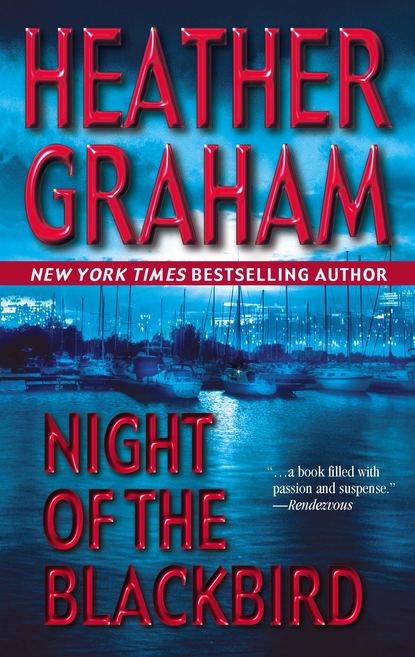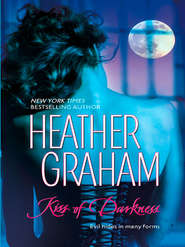По всем вопросам обращайтесь на: info@litportal.ru
(©) 2003-2025.
✖
Night Of The Blackbird
Автор
Год написания книги
2018
Настройки чтения
Размер шрифта
Высота строк
Поля
“Wait, wait, let her have a sip of her tea before they ply her with alcohol,” Granny Jon protested, bringing a cup to Moira. Moira thanked her with a quick smile. No one made tea like Granny Jon. Not cold, not scalding. A touch of sugar. Never like syrup, and never bitter.
“It’s delicious, Granny Jon,” Moira said.
“Then swallow it down and be gone with you,” her mother said.
She gulped the tea—grateful that it wasn’t scalding.
“I’ll put your bag in your room—give me your coat, Moira Kathleen,” Katy said. “Take the inside stairs down. You know your father will be behind the bar.”
“I’ll be rescuing the teacup,” Granny Jon said dryly.
Moira slid obediently out of her coat and handed it to her mother. “I’ll take my bag, Mum. It’s heavy.”
“Away with you, I can handle a mite of luggage.”
“All right, all right, I’m going. ‘So happy you’re here, now get out,”’ she teased her mother.
“’Tis just your father, girl,” Katy protested.
“How is he?” she asked anxiously.
Her mother’s smile was the best answer she could have received. “His tests came out well, but he was told that he must come in without fail for a checkup every six months.”
“He’s working too hard,” Moira murmured.
“Well, now, that was my thought, but the doctors say that work is good for a man, and sitting around and getting no exercise is not. So he got all the permission he needed to keep right on running his pub, though the Lord knows, he has able help.”
“I’m going down right now to see him.”
Her mother nodded, pleased.
Moira gave both her mother and grandmother another kiss, then started through the foyer to the left; there was a little sitting room there, and a spiral staircase that led down to a door at the foot of the stairs that opened to the office and storage space behind the polished oak expanse of the bar, where she would find the rest of her family—and all the mixed emotions that coming home entailed.
3
As soon as she opened the door, Moira could hear the chatter in the bar and the sounds of the band. She groaned inwardly. Blackbird was doing a speeded up number from the Brendan Behan play The Hostage.
“Great,” she muttered aloud. “They’re all toasting the Republic already.”
She slipped in, walked through the office and the swinging doors, and saw her father’s back. Eamon Kelly was a tall, broad-shouldered man with graying hair that had once been close to a true, luxurious black. Though he was pouring a draft, she sneaked up behind him, winding her arms around his waist. “Hey, Dad,” she said softly.
“Moira Kathleen!” he cried, spilling a bit of draft as he set the glass down, spun around and picked her up by the waist. He lifted her high, and she kissed his cheek, quickly protesting his hold, worried about his heart.
“Dad, put me down!” She laughed.
He shook his head, beautiful blue eyes on her. “Now when the day comes that I cannot lift my girl, that will be a sad day indeed!”
“Put me down,” she said again, still laughing, “because I feel as if everyone in the pub is looking at me!”
“And why not? Me daughter has come home!”
“You’ve got another daughter in her—”
“And I’ve already made quite a spectacle of Colleen, I have. Now it’s your turn!”
She managed to regain her footing, then hugged him fiercely again.
“You know the boys at the bar, eh, daughter? Seamus and Liam, Sal Corderi, the Italian here, Sandy O’Connor down there, his wife, Sue—”
“Hello!” Moira called to them all.
“Well, now, I’d be taking a hug and a kiss,” Seamus told her.
“And you’d not leave me out!” Liam protested.
“One more for Dad, then I’ll come around the bar,” she said, holding her father closely to her once again. “Are you supposed to be working this hard?” she asked him softly.
“Ah, now, pouring a draft isn’t hard work,” he told her. Then he pulled back and frowned. “And you, did you fly in alone?”
She smiled. “Dad, I live and work in New York City. I travel all over the country.”
“But there’s usually someone with you.”
Puzzled, Moira shook her head. “I took a cab to the airport, got on a plane, then took a cab here.”
“Boston’s not the safest city in the world these days,” Liam said. Moira noted that he and Seamus had a newspaper spread out between them at the bar.
“I don’t think it’s ever been crime free,” Moira said lightly. “No major metropolis goes without crime. That’s why you raised intelligent, streetwise children, Dad.”
“He’s thinking about the girl,” Liam told her.
Moira frowned. “What girl?”
“A prostitute found in the river,” Seamus said.
“Dead,” Liam added sadly.
“Strangled,” Seamus finished with sorrowful drama.
She looked at her father, finding the situation sad, as well, but wondering why this news should suddenly make him worried about her. “Dad, I promise you, I haven’t taken up the world’s oldest profession as a sideline.”
He shrugged. “Now, Moira—”
“He’s afraid there might be a serial killer in the city,” Liam said, shaking his head. “Apparently the woman plied her trade around the hotel and attracted men of means. Therefore, you see, any lovely lass might be a target. But we’re not here to get you down, Moira, girl. There are fine things happening as well. Let’s look to the good news! We’re getting one of the most important politicians in Northern Ireland for our very own Saint Patrick’s Day parade. Mr. Jacob Brolin is coming here, right to Boston, can you imagine?”
“Oh?” Moira murmured, afraid to say more. Josh, who hailed from the deep South, had told her about a round table he had attended where men still sat together, engaging in deep and sometimes passionate discussions regarding the American Civil War. Josh was an American history buff. At Kelly’s, too, often they relived battles—and the fighting that had eventually led to the Irish Free State and the Republic of Ireland. They drank to the Easter Rebellion solemnly, bemoaning the fate of the freedom fighters executed after the surrender. They argued the strategies of the leaders, they spoke for and against the hero Michael Collins and ripped apart Eamon De Valera, the American-born first president of the Irish Republic. Of course, it always came back to the same thing: if only, from the very beginning, the island had been recognized as one nation—an Irish nation—they would never have had The Troubles that followed. She personally felt rather sorry for Michael Collins. He’d risked his life time and again, devoted himself wholeheartedly to the cause, managed the first true liberation of any of his people, and, in the end, been killed by a faction of his own people for not managing to take the entire island at once.
“Aye, a fine man, this Jacob Brolin,” her father said, brightening. “Why, the flyers are out at the front entry, daughter. We’re privileged, we are. You ought to know this already.”











